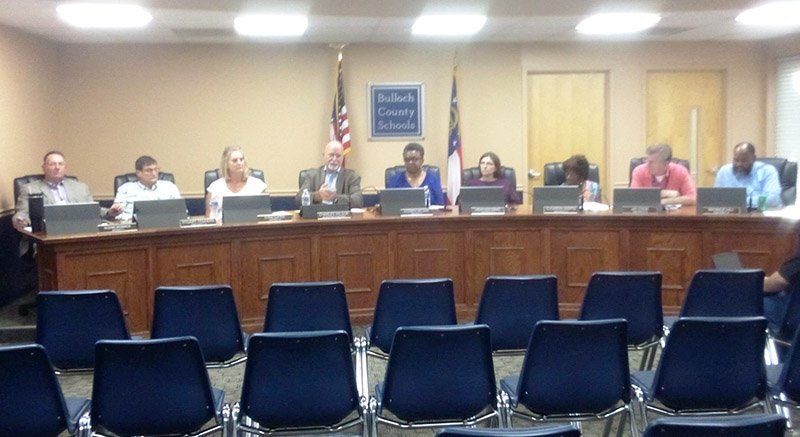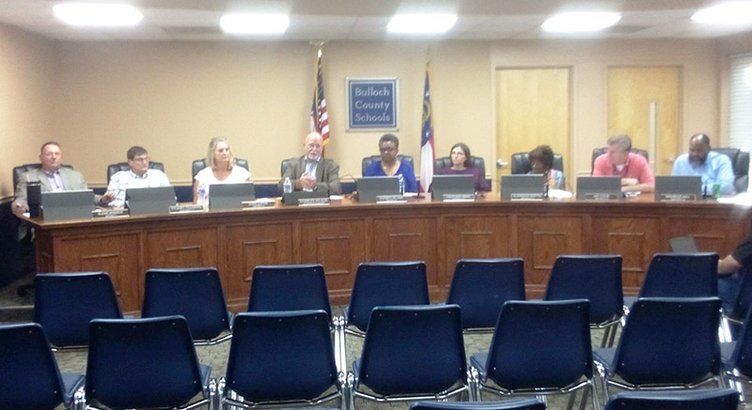While moving forward with “tax increase” hearings required for an incomplete rollback of their 2024 property tax millage rate, the Bulloch County Board of Education and Superintendent Charles Wilson have begun looking into the possibility of a future homestead exemption, possibly for senior citizens.
Creating a county-specific exemption, if the board chooses to do so, could take “about a two-year process,” Wilson said. In discussion with citizens during the Thursday evening, Aug. 15 tax hearing, he noted that Robert Fisher, deputy chief appraiser for the Bulloch County Board of Tax Assessors, is slated to talk to the school board during its 6:30 p.m. Aug. 22 “work session” regular meeting.
“He’s coming next week to talk to the board at our work session, to spend time with us educating the board on tax exemptions, how they’re designed, how you can go about pursuing them, what the processes are,” Wilson said. “I think the board is interested in that.”
During the hearing, District 1 BOE member-elect Lannie Lanier addressed the board as a citizen, and continued in informal public conversation with Wilson. Lanier served on the board more than a decade ago and recently ran unopposed to succeed current member Glenn Womack, who did not seek re-election,
One of the things Lanier called for, as have other board-members elect and other Bulloch residents, was “tax relief for senior citizens.”
“That is important because you’ve got seniors living on fixed incomes and the taxes go up and up and up,” Lanier said. He called the possibility of seniors being taxed out of their homes “a real situation.”
Wilson noted that when a senior exemption from school tax was discussed in previous years, some other citizens had suggested that “maybe that’s not the way to look at it, maybe it should be income-based because there’s a lot of senior citizens have wealth; a lot of young people don’t.”
An exemption could include age as well as an income in some way, he said, and told Lanier, who will take his seat on the board at the beginning of January, that he will probably be there in time to help make a decision on that. But Wilson said his understanding of what might be done has expanded after conversations with the county tax appraisers.
“I think what we’re going to hear from them is, the board can devise its own tax exemption,” Wilson said. “Now, it has to be approved by the voters of Bulloch County.”
State amendment
Meanwhile, a proposed amendment to Georgia’s State Constitution that will appear on the Nov. 5 general election ballot could limit inflationary growth in future tax appraisals as applied to owner-occupied homes. This is also likely to be part of the continued conversation Thursday, Aug. 22, Wilson said.
If the amendment passes, school boards, county commissioners and city councils will have until March 1, 2025 to decide whether opt out of the new, “floating” statewide homestead exemption that would be used to limit homeowners’ tax appraisals to a general “cost of living” inflation rate.
For example, the federal cost-of-living increase based in the Consumer Price Index, or CPI, 4.1% from 2022 to 2023 and 3.2% from 2023 to 2024, has been much lower than Bulloch County’s residential real estate price inflation of more than 13% each of those years.
“I’m just going to use 3.2%,” Wilson said. “If that occurs, then that means someone living in their home won’t see it go up 18% or 14% or whatever. … If the board does not opt out, then it will be forever locked in that re-evaluations will be limited to that inflation index. I don’t know whether that will help us, but it will help individuals, sounds like, living in their primary residence.”
He referred to the state legislation as House Bill 581. That complex bill, now law, contains the provision for the added statewide homestead exemption to be adjusted annually to the inflation rate, provided that the amendment passes.
But the actual amendment question is in House Resolution 1022: “Shall the Constitution of Georgia be amended to as to authorize the General Assembly to provide by general law for a state-wide homestead exemption that serves to limit increases in the assessed value of homesteads, but which any county, consolidated government, municipality, or local school system may opt out of upon the completion of certain procedures?”
The 6 p.m. Thursday, Aug. 15, tax increase hearing was the second of three hearings the board is required to have after formally announcing a tax increase. The first hearing was held at 11:30 a.m., also Aug. 15.
Seven of the eight current board members attended the 11:30 a.m. hearing and all eight attended the 6 p.m. hearing. Two citizens, Tim Powell and District 7 BOE member-elect Lisha Nevil, signed up to speak during the 11:30 hearing. During the 6 p.m. hearing, which the reporter attended, Lanier and Cassandra Mikell signed up and spoke to the board.
Mikell and Lawton Sack, co-founders of the Bulloch Action Coalition, which opposes this and other tax increases, also participated in informal discussion with Wilson and current board members who spoke to them the dais.
The third hearing is scheduled for 9 a.m. Thursday, Aug. 22, and the board of education could set the final school operations tax millage during the 6:30 p.m. Thursday meeting.
As Alison Boatright, the school district chief financial officer, reviewed Thursday, the rate is being reduced from last year’s 8.478 mills to 7.932 mills.
That is a 0.546-mill, or 6.44%, decrease in the rate, as such. Bulloch County currently has one of the 10 lowest property tax millage rates for school operations in the state, and considered just as a factor in levying taxes and not by the dollar value, 7.932 mills would be the Bulloch Schools’ lowest rate in well over a decade.
However, under the state law known as the Georgia Property Taxpayer’s Bill of Rights, the new rate requires tax increase hearings because it does not fully compensate for inflation in property values as determined by the county Board of Tax Assessors.
The “rollback rate” the school system would need to adopt to fully offset the average overall inflation in property values would be 7.558 mills, or 4.95% less than the 7.932-mill rate now proposed. So, the school system’s notices for the hearings described this as a 4.95% tax increase.
This would be a $37.40 increase, on average, in tax on non-homestead property now valued at $250,000.
On a $250,000 owner-occupied home with the standard homestead exemption, the total school tax would be $777.34 and the average increase, $36.65.
14-mill minimum
For a third consecutive year, Bulloch County – largely because it uses the original Local Option Sales Tax to help fund the schools and has one of Georgia’s lowest property tax rates for school funding – comes up against a dilemma created by a requirement that all districts maintain a “minimum equivalent millage rate” of 14 mills to remain eligible for state equalization funding.
Bulloch County Schools’ 2023 Local Options Sales Tax revenue was the equivalent of 6.068 mills. Subtracting 6.068 mills from 14 mills leaves 7.932 mills, now the proposed millage rate.
$9.8 million at risk
Although the projected rise in property tax revenue after the partial rollback – including inflation as well as construction growth – is a little over $2 million, not maintaining the 14-mill rate would put Bulloch’s $9.8 million in equalization funding at risk, said Boatright and Wilson.
Noting that “citizens are still paying more tax,” Mikell asserted that school officials’ descriptions of the situation were misleading. Sack asserted that the board should still adopt a full rollback and said he did not believe state officials would penalize Bulloch County with loss of the full $9.8 million.
But Wilson said that, as superintendent, he could not in good conscience advise the board to take that risk.
Lanier, who had spoken first, said he has been getting many phone calls, texts and emails and knows there are many things people can criticize the board about.
“But in this situation, I have to give you a break because I explain to people that the 14 mills is the law; it’s a bad law,” he said. “All of the efforts and the angst going into this 14-mill tax situation should be directed somewhere else.”
Lanier asserted that state Sen. Billy Hickman and Reps. Butch Parrish, Lehman Franklin and Jon Burns should have it brought “to their attention to make it a priority to get this law changed.”

